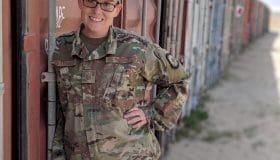5 Superstitions in the Military
October 28, 2025
In the unpredictable world of military life, superstitions can serve as small anchors of comfort. Whether rooted in history, folklore, or coincidence, these beliefs often carry more weight than outsiders might expect. For many Service Members, they’re not just “silly traditions”—they’re habits of hope and caution that have stood the test of time.
Here are five of the most well-known military superstitions and how they came to be.
1. Never Say It’s Slow
In any command center, medical unit, or security post, there’s one word you’ll rarely hear out loud: “slow.”
Where it came from:
This superstition has roots not only in the military but in emergency services and hospitals as well. It’s said that the moment someone says, “It’s been slow today,” the peace will be shattered, alarms will go off, calls will pour in, and chaos will begin.
For troops, especially those in combat zones or on guard duty, saying it’s “slow” is almost like daring fate to prove otherwise. Whether it’s a coincidence or cosmic irony, too many Service Members have watched calm shifts turn upside down immediately after the phrase was uttered. So, in most units, it’s better to just stay quiet.
2. Charms Candy = Bad Luck
Among troops who served in the 1990s and early 2000s, there was one item in MREs (Meals, Ready-to-Eat) that no one wanted: Charms candy.
Where it came from:

Originally, Charms were meant to be a sweet morale booster. But over time, rumors began to spread that the candies were cursed. Soldiers and Marines claimed that eating them brought rain, mechanical failures, or worse. Some even assigned each flavor its own omen—lemon for vehicle trouble, lime for bad weather, and raspberry for death.
The superstition became so widespread that troops began tossing Charms out the moment they opened an MRE. Eventually, the manufacturer stopped including them altogether. For many, it wasn’t just about coincidence—it was about not taking chances in a job where luck can mean survival.
3. Apricots are Bad Luck
If you ever offer a tank crew an apricot, fresh, canned, or even in jam, don’t be surprised if they quickly turn it down. Among armored units, apricots are practically forbidden.
Where it came from:
This superstition dates back to World War II, when Marines and Army tankers noticed a strange pattern. After a series of vehicle breakdowns and accidents, someone realized that apricots had been present each time, whether as part of a ration, a snack, or even printed on packaging. The connection stuck, and soon “apricots mean trouble” became standard belief in tank and vehicle crews.

Over time, the lore spread across generations. Many modern Service Members still avoid apricots while deployed, seeing it as tempting fate to bring the “cursed fruit” anywhere near their vehicles.
4. Don’t Carry a White Lighter
Among Service Members, carrying a white lighter is considered a sure way to invite bad luck.
Where it came from:

This superstition has several possible origins. Some believe it started in the Marine Corps after an Amphibious Assault Vehicle accident, where a white lighter was found in the wreckage. Others trace it to the so-called “white lighter curse” in pop culture, rumored to be linked to musicians like Jimi Hendrix and Janis Joplin—artists who all died young and were said to have white lighters with them.
Regardless of its roots, the myth found fertile ground among troops. In high-risk environments, it doesn’t take much for a symbol of bad luck to stick. Today, some Service Members refuse to even touch a white lighter, preferring not to test the curse themselves.
5. Three on a Match
This superstition is one of the oldest across military history.
Where it came from:
The saying “three on a match” dates back to World War I trench warfare. Soldiers believed that lighting three cigarettes from the same match would bring death to the third person. The story goes that an enemy sniper, watching for movement at night, would see the first light, take aim on the second, and fire by the third.
Even though modern warfare has changed, the superstition remains a familiar part of military folklore.
Why These Beliefs Endure
Superstitions might seem trivial, but for Service Members, they serve a deeper purpose. They’re ways to manage uncertainty, create shared meaning, and connect across generations of troops who’ve faced the same fears.
At Soldiers’ Angels, we know that morale, belief, and tradition are all part of what keeps Service Members strong. Whether it’s a lucky coin, a well-worn ritual, or an old superstition, these customs remind us that even in the toughest environments, humanity and hope endure.
About the Author

Dallas Green served in the U.S. Air Force for 5 years. She began her journey with Soldiers’ Angels as a SkillBridge Marketing Intern and now continues to support their mission as a Veteran Intern while pursuing her bachelor’s degree through Arizona State University.


